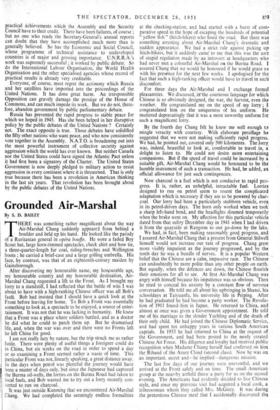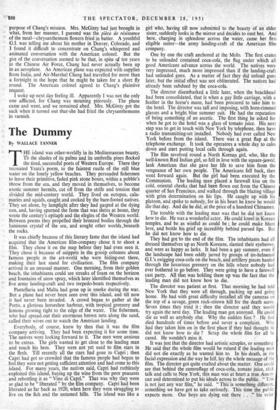Grounded Air-Marshal
By S. D. BAILEY THERE was something rather magnificent about the way Air-Marshal Chang suddenly appeared from behind a boulder and held up his hand. He looked like the paiody of a Ruritanian general in opera bouffe. He wore a faded Boy Scout hat, large horn-rimmed spectacles, check shirt and bow tie, a three-quarter-length fur coat, riding-breeches and Wellington boots ; he carried a brief-case and a large golfing umbrella.. His face, by contrast, was that of an eighteenth-century maiden by • Gainsborough.
After discovering my honourable name, my honourable age, my honourable country and my honourable destination, Air- Marshal Chang requested a lift to the Front. As I brought my lorry to a standstill, I had reflected that the battle of wits I was about to have with a high-ranking Chinese officer was all Bob's fault. - Bob had insisted that I should have a quick look at the Front before leaving for home. To Bob a Front was essentially something-to look at, a spectacle to be enjoyed, a source of enter- tainment. It was not that he was lacking in humanity. He knew that a Front was a place where soldiers battled, and as a doctor he did what he could to patch them up. But -he dramatised life,. and, when the war was over and there were no Fronts left he left China for good. I am not really lazy by nature, but the trip struck me as rather futile. There were plenty of useful things a foreigner could do in China, but six weeks on the road in order to spend a day or so examining a Front seemed rather a waste of time. This particular Front was not, linearly speaking, a great distance away. In the days when petrol was plentiful the journey, would have been a matter of days only, but since the Japanese had captured the Burma oil-wells, the lorries on the Burma Road had taken to 1 local fuels, and Bob wanted me to try out a lorry recently con- . verted to run on charcoal. .
'It was just outside Kunming that we encountered Air-Marshal Chang. We had - completed the seemingly endless formalities at the checking-station, and had started with a burst of com. parative speed in the hope of escaping the hundreds of polential "yellow fish" (hitch-hikers) who lined the road. But there was something arresting about Air-Marshal Chang's dramatic and sudden appearance. We had a strict rule against picking up hitch-hikers, but it suddenly came' to me that this was the sort of stupid regulation made by an introvert at headquarters who had never met a colourful Air-Marshal cm the Burma Road. I assured Chang that we would be honoured if he would grace us with his presence for the next few weeks. I apologised for the fact that such a high-ranking officer would have to travel in such discomfort.
For three days the Air-Marshal and I exchange formal pleasantries. We discussed, in-the courteous language for which Chinese is so obviously designed, the war, the harvest, even the weather. He congratulated me on the speed of my lorry • I congratulated him on the uniqueness of his uniform. he muttered deprecatingly that it was a most unworthy uniform foc such a magnificent lorry.
By the fourth day Chang felt he knew me well enough to mingle veracity with courtesy. With elaborate persiflage he suggested that we were not making sufficiently rapid progress. We had, he pointed out, covered only 500 kilometres. The lorry was, indeed, beautiful to look at, comfortable to travel in. a delight to listen to. He could not desire more entertaining companions. But if the speed of travel could be increased by a suitable gift, Air-Marshal Chang would be honoured to be the humble instrument of such a transaction. He bad, he added, att official allowance for just such contingencies.
Now charcoal is a fuel which is not conducive to rapid pro- gress. It is. rather, an unhelpful, intractable fuel. Lorries designed to run on petrol seem to resent the complicated adaptation which is necessary if they are to be powered by char- coal. Our lorry had been a particularly stubborn vehicle, even in its petrol-driven days. The born only worked when we took a sharp left-hand bend, and the headlights dimmed temporarily when the brake went on. My affection for this particular vehicle dated from that sultry December day in 1941 when I bad driven it from the quayside at Rangoon to our go-down by the lake.
We had, in fact, been making reasonably good progress. and I assured Air-Marshal Chang that a present from General Stilwell himself would not increase our rate of progress. Chang grew, more visibly impatient as the journey progressed, and by the tenth day he was a bundle of nerves. It is a popular Western _ belief that the Chinese are a calm, impassive race. The Chinese can undoubtedly be more polite than any other people on earth. But equally, when the defences are down, the Chinese flourish their emotions for all to see. At first Air-Marshal Chang was angry with himself because his impatience was so obvious. Then he tried to conceal his anxiety by a constant flow of nervous conversation. He told me all about his upbringing in Shansi, his schooldays at Taiyuanfu, his university life in Peiping. After he had graduated he had become a party worker. The Revolu- tion of 1911 found- him in Japan. He returned to China, and almost at once was given a Government appointment. He told me of his marriage to the slender Yuehling and of the death of their only child. He had joined the Chinese Diplomatic Service, and had spent ten unhappy years in various South American capitals. In 1933 he had returned to China at the request of the Government, and had been posted to the newly created Chinese Air Force. His diligence and loyalty had received public recognition when Madame Chiang herself had conferred on hint the Riband of the Azure Cloud (second class). Now he was on an important, secret and—he implied—dangerous mission.
The last few days of our journey were uneventful, and we arrived at the Front safely and on time, The small American group at the near-by airfield threw a party for us on the second evening. The Americans had evidently decided to live Chinese style, and since my previous visit had acquired a local cook, a tribeswoman whom they called Mrs. McGinty. It was during the pretentious Chinese meal that I accidentally discovered the purpose of Chang's' mission. Mrs. McGinty had just brought in what, from her manner, I guessed was the piece de resistance r' of the meal—chrysanthemum flowers fried in batter. A youthful G.I. was telling me about his mother in Denver, Colorado, and I found it difficult to concentrate on Chang's whispered and animated conversation with the American colonel. But the gist of the conversation seemed to be that, in spite a ten years in the Chinese Air Force, Chang had never actually been up in an aeroplane. An American plane was expected with supplies from India, and Air-Marshal Chang had travelled for more than a fortnight in the hope that he might be taken for a short fly round. . The American colonel agreed to Chang's Plaintive request. • I woke up next day feeling ill. Apparently I was not the only one afflicted, for Chang was moaning piteously. The plane came and went, and we -remained abed. Mrs. McGinty got the sack when it turned out that' she had fried the chrysanthemums in varnish.































 Previous page
Previous page